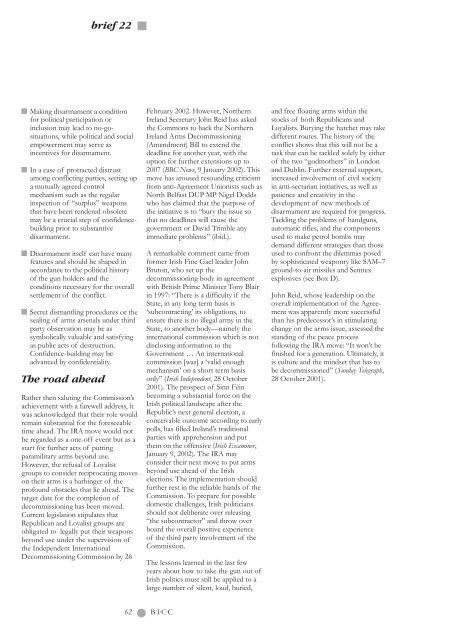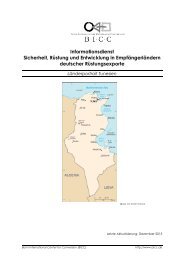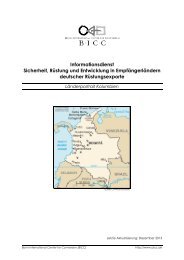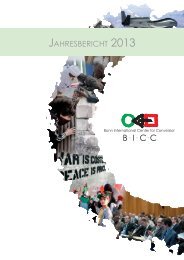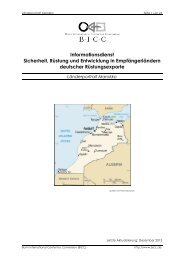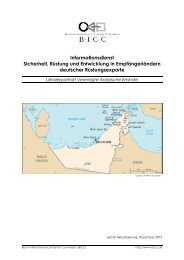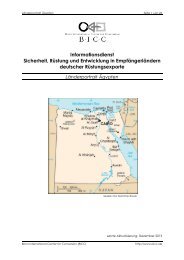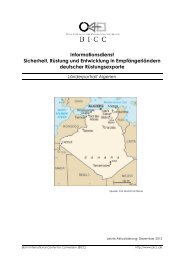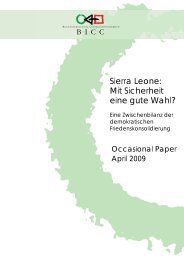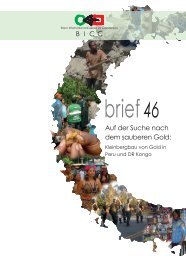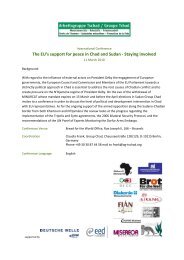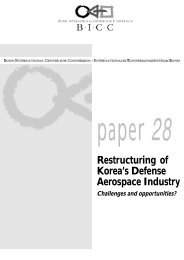English - BICC
English - BICC
English - BICC
Create successful ePaper yourself
Turn your PDF publications into a flip-book with our unique Google optimized e-Paper software.
ief 22<br />
Making disarmament a condition<br />
for political participation or<br />
inclusion may lead to no-gosituations,<br />
while political and social<br />
empowerment may serve as<br />
incentives for disarmament.<br />
In a case of protracted distrust<br />
among conflicting parties, setting up<br />
a mutually agreed control<br />
mechanism such as the regular<br />
inspection of “surplus” weapons<br />
that have been rendered obsolete<br />
may be a crucial step of confidencebuilding<br />
prior to substantive<br />
disarmament.<br />
Disarmament itself can have many<br />
features and should be shaped in<br />
accordance to the political history<br />
of the gun holders and the<br />
conditions necessary for the overall<br />
settlement of the conflict.<br />
Secret dismantling procedures or the<br />
sealing of arms arsenals under third<br />
party observation may be as<br />
symbolically valuable and satisfying<br />
as public acts of destruction.<br />
Confidence-building may be<br />
advanced by confidentiality.<br />
The road ahead<br />
Rather then saluting the Commission’s<br />
achievement with a farewell address, it<br />
was acknowledged that their role would<br />
remain substantial for the foreseeable<br />
time ahead. The IRA move would not<br />
be regarded as a one-off event but as a<br />
start for further acts of putting<br />
paramilitary arms beyond use.<br />
However, the refusal of Loyalist<br />
groups to consider reciprocating moves<br />
on their arms is a harbinger of the<br />
profound obstacles that lie ahead. The<br />
target date for the completion of<br />
decommissioning has been moved.<br />
Current legislation stipulates that<br />
Republican and Loyalist groups are<br />
obligated to legally put their weapons<br />
beyond use under the supervision of<br />
the Independent International<br />
Decommissioning Commission by 26<br />
February 2002. However, Northern<br />
Ireland Secretary John Reid has asked<br />
the Commons to back the Northern<br />
Ireland Arms Decommissioning<br />
(Amendment) Bill to extend the<br />
deadline for another year, with the<br />
option for further extensions up to<br />
2007 (BBC News, 9 January 2002). This<br />
move has aroused resounding criticism<br />
from anti-Agreement Unionists such as<br />
North Belfast DUP MP Nigel Dodds<br />
who has claimed that the purpose of<br />
the initiative is to “bury the issue so<br />
that no deadlines will cause the<br />
government or David Trimble any<br />
immediate problems” (ibid.).<br />
A remarkable comment came from<br />
former Irish Fine Gael leader John<br />
Bruton, who set up the<br />
decommissioning body in agreement<br />
with British Prime Minister Tony Blair<br />
in 1997: “There is a difficulty if the<br />
State, in any long term basis is<br />
‘subcontracting’ its obligations, to<br />
ensure there is no illegal army in the<br />
State, to another body—namely the<br />
international commission which is not<br />
disclosing information to the<br />
Government … An international<br />
commission [was] a ‘valid enough<br />
mechanism’ on a short term basis<br />
only” (Irish Independent, 28 October<br />
2001). The prospect of Sinn Féin<br />
becoming a substantial force on the<br />
Irish political landscape after the<br />
Republic’s next general election, a<br />
conceivable outcome according to early<br />
polls, has filled Ireland’s traditional<br />
parties with apprehension and put<br />
them on the offensive (Irish Examiner,<br />
January 9, 2002). The IRA may<br />
consider their next move to put arms<br />
beyond use ahead of the Irish<br />
elections. The implementation should<br />
further rest in the reliable hands of the<br />
Commission. To prepare for possible<br />
domestic challenges, Irish politicians<br />
should not deliberate over releasing<br />
“the subcontractor” and throw over<br />
board the overall positive experience<br />
of the third party involvement of the<br />
Commission.<br />
The lessons learned in the last few<br />
years about how to take the gun out of<br />
Irish politics must still be applied to a<br />
large number of silent, loud, buried,<br />
62 B·I·C·C<br />
and free floating arms within the<br />
stocks of both Republicans and<br />
Loyalists. Burying the hatchet may take<br />
different routes. The history of the<br />
conflict shows that this will not be a<br />
task that can be tackled solely by either<br />
of the two “godmothers” in London<br />
and Dublin. Further external support,<br />
increased involvement of civil society<br />
in anti-sectarian initiatives, as well as<br />
patience and creativity in the<br />
development of new methods of<br />
disarmament are required for progress.<br />
Tackling the problems of handguns,<br />
automatic rifles, and the components<br />
used to make petrol bombs may<br />
demand different strategies than those<br />
used to confront the dilemmas posed<br />
by sophisticated weaponry like SAM–7<br />
ground-to-air missiles and Semtex<br />
explosives (see Box D).<br />
John Reid, whose leadership on the<br />
overall implementation of the Agreement<br />
was apparently more successful<br />
than his predecessor’s in stimulating<br />
change on the arms issue, assessed the<br />
standing of the peace process<br />
following the IRA move: “It won’t be<br />
finished for a generation. Ultimately, it<br />
is culture and the mindset that has to<br />
be decommissioned” (Sunday Telegraph,<br />
28 October 2001).


